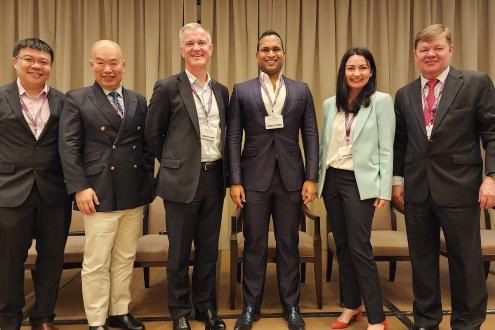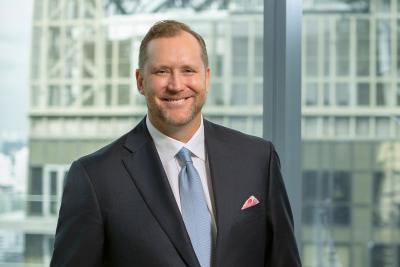How do you Run a Family Office Efficiently and Successfully?

Bryan Henning of Eton Solutions
Apr 4, 2023
When you establish and then operate a family office, what are the key elements to consider and then get right? What is the right structure, staffing and what do you handle in-house and what do you outsource? How do you select your vendors and partners? These were some of the key questions addressed by experts at the second panel discussion of the remarkably successful one-day Hubbis Family Office Forum in Singapore on February 9. The event was presented in exclusive partnership with US headquartered family office advisor and solutions provider Eton Solutions and timed alongside the announce of their international HQ for Europe, the Middle East and APAC in Singapore. The Forum was sub-titled ‘Creating & Operating a Modern, Efficient and Fit-for-Purpose Family Office’ and brought together speakers and attendees from Single-Family Offices, Multi-Family Offices, private banks, independent wealth firms, trustees, lawyers, accountants, consultants, immigration specialists, regulators and other experts from the wider family office and wealth management ecosystem. Hubbis has summarized some of the key insights from the experts who sat on this panel.
The Panel
Chair: Bryan Henning, SVP, Head of International, Eton Solutions
Speakers:
- Andrew Hull, Chief Executive, Todd Family Office
- Bryan Goh, Chief Executive Officer, Chief Investment Officer, Tsao Family Office
- Spencer Hsu, Associate Partner, Private Tax Services, Ernst & Young Advisory
- Vikna Rajah, Head Tax & Trust, Co-Head Private Wealth, Rajah & Tann
- Lucia Luchetti, Head of Trusts, Equiom Singapore
Key Insights & Observations
Single-Family Offices have many moving parts and governance, and efficiency are vital for optimizing missions and outcomes
An Asia-based Single-Family Office (SFO) head on the panel opened the discussion. He explained how their Asia-based family office launched in 2012 and was initially mostly centred on performing a treasury function, which meant that from the point of view of execution, infrastructure was fairly light.
The SFO has over the years evolved from two investment executives and 13 people in the back office to eight people on the investment front and six in the back office. “And we have had to change the infrastructure, build it up, create policies, processes, consultants, outsourcing parties, in order that we can now invest across the globe in all these various markets,” the CEO/CIO reported. “We now run strategies across the globe, in equities, and credit, and in private and public markets.”
He added that their return targets are fairly modest, or were deemed fairly modest at 5% over the risk-free rate. “Risk free has changed those plans by now rising to 4% to 4.5%, but in the scheme of things, we still have fairly modest target returns,” he said. “And we also focus on an ESG and impact agenda.”
As to key lessons learned along the way, this expert also highlighted the importance of robust governance. He said that although as an SFO, they do not have regulatory oversight, he wanted to build something that was compliant with regulatory standards for the longevity of the SFO for future generations.
“The result is that if we invited the regulators in, I think they would be happy with what they find, as it has been re-tooled to more institutional levels,” he elucidated. “There are additional costs, which look unnecessary, but in my experience, these costs are justified, and we believe it is a bonus to have that institutional quality governance and infrastructure, because it pays off elsewhere in market and also process/operational risk management.”
He added that outsourcing is valuable as well. “We are there to make decisions based on information and judgement,” he said, “hence anything that can be outsourced outside of this function, we think should be outsourced. To this end, we work with many partners in outsourcing those non-core activities.”
The largest Single-Family Offices can be remarkably complex and comprehensive entities that require the best of institutional and blue-chip corporate practices and governance
One of Asia Pacific’s larger SFOs was represented at the discussion, with the CEO explaining that the family today houses some 260 family members and that, on a daily basis, their SFO is interacting with all of these clients, all of these family members, and those numbers do not even count the wives, husbands and others.
That, he said, all translates into about 700 legal entities that the SFO deals with, and that number can be multiplied by 2-3 times to understand the number of investment portfolios, cash portfolios, lending and other products or services the SFO covers or provides. He added that the SFO team today stands at about 35 strong and is structured to cope both with current and future anticipated missions and challenges.
“There is huge complexity,” he said, “which is why we looked at the likes of Eton Solutions, as they enable us to focus on what we are best at, on where we truly add value, and where we are not genuine specialists,” this expert told guest.
He said they want to focus their energies and attention on the key services that they provide, everything from investments to advice around taxes to advice around trust, legal advice, tax compliance, taxation and tax returns, real estate transactions, estate management, and also helping family members with their other business transactions. “We might provide a whole range of support to family members, anything from paying the bill for their dog walkers to more complex transactions,” he reported. “And remember that families are not static - every year the family the SFO serves increases in size by 2.5% to 5%.”
He concluded his introduction by remarking on one of the key lessons he had learned was the vital importance of choosing the right partners. He said he had stories of failed relationships where they had invested a lot of time and effort to building some partnerships that did not work out. “Getting this right in the first place is so important,” he stated.
Family offices, trusts and trustees – vital relationships that must work well for all the parties involved
A trust expert opined on the importance of their relationships with families and the family offices that more and more such wealthy families are establishing.
“Many of our existing clients are considering family offices structures, and a key element is the vital importance of expertise at the trustee, and also a single point of contact through which to liaise with the trustee and to bring about the right expertise and quality within the ecosystem. They said as a trustee with long experience and also being independent, they have deep understanding of these families’ needs and psychologies.
“No family is the same,” she said. “Some might have real financial expertise, others might come from other industries and it is important that we help elevate all their understanding around what we do and what they also need to run their family offices effectively.”
She remarked that Asian clients really like to keep control over investments, so from the trustee’s perspective, it is about finding the right balance. “The family office and family members really want to play their part in making decisions, and we are an independent party that has to guide them and make sure that the whole setup is efficient and fit for purpose,” she concluded.
The importance of robust, prescient operational controls, family constitutions, succession planning and strong governance
A leading lawyer who specializes in private wealth and structures explained that all too often families set about establishing their family offices without really deep and insightful planning and objectivity. “We really need to take a step back and ensure that we provide the requisite level of advice to the clients in these matters,” he opined.
He said focusing on areas such as governance, including the family constitution, and other key elements are crucial. He noted that these issues can be very time consuming, but formalising or properly articulating the family values, and the family office relationships with partners, with employees, with the community, even with the authorities and the government are also important elements to consider when setting up the framework and the constitution. The family needs to think about the type of brand or impression the family wants to portray to other family members, to employees, and to the wider community.
He said the family constitution should also define the relationship between the family office, family council, and even the management of the family’s other business enterprises. Another key element is the creation of very clear dispute resolution mechanisms in the family constitution. Team members at the family office should be rewarded properly and their remuneration should be in line with the family’s targets and risk appetites.
This same speaker added that objectivity and controls are essential – he said studies have shown that when the FO also have board of independents, their return on assets is actually higher. “It really makes sense when you set up the family office to think about getting in some independent board members as well,” he concluded.
He added that the right ecosystem of partnerships and professionals to work with is vital to optimizing outcomes. “It is really a pleasure to be working with professionals who have deep technical knowledge and who have experience in setting up complex family offices, so that from the start, you are able to get that sort of level of strategy and structure in all areas and certainly in terms of succession planning and governance.”
Another guest took up the baton on these issues, adding that from their consulting viewpoint, FOs still lack in areas such as strong policies, processes, governance frameworks, as well as in data management and reporting for tracking their investments and exposures.
Cybersecurity is also a key area often somewhat neglected by many of the family offices. He pointed to a survey they had conducted that highlighted how more than 75% of the family offices the interviewed had experienced cyber-attacks on their systems, while only about 25% of these family offices actually had a cybersecurity plan in place.
Build the SFO for today, plan effectively, and also have a sharp eye on the future and on scalability
Another key area of focus is scalability, this particular expert also remarked. He explained that many SFOs start off with modest objectives and at a small size, and do not think they need the governance and risk management policies they associate with larger institutions. “Actually, they can build a scaled-down version of such policies that can not only serve their needs for the time being, but also support their further growth over the longer term,” he reported.
A key problem for many FOs in Asia is recruiting and retaining the right expertise. In Singapore, he said there is an estimate that family offices account for about 1% of the entire financial sector employment, but those who work in those family offices need very broad and deep skills and experience. “Your family office might be small, yet your responsibilities are very wide,” he observed. “Talent development, training, and alignment on the missions and incentives are all very important.”
From the SFO’s viewpoint, scalability of capabilities is also vital. “Being able to scale up activities and focus on the key points around advice, relationships and keep building up trust over time are all essential,” another family office expert added. “In the journey we have taken, we have scaled up everything from the back office operations onwards.”
For example, he explained that when he first started, they were their own custodian, but he soon decided it was really not a smart area to focus as many as five of the then 25 staff on, as it also diverted management time and energy as well, and involved associated risks. Accordingly, that role was carved out to external specialists.
“The family also keeps expanding,” he added, “which means we have more tasks and challenges for more people. “Accordingly, it was so important for us to then assess, well, what else can we need to scale up.”
He said investments is one of the areas you do not really think about as being scalable but when you reach a certain scale, you really need to think about how to offer a very broad set of investments for the family. “Scaling up and setting up the right tax efficient structures, and really looking at how we can provide the best service to the family members has been critical,” he explained. “In short, scaling up doesn't just stop with back office, it is every part of your business. You need the right people, and the right skills.”

SVP, Head of International at Eton Solutions

More from Bryan Henning, Eton Solutions
Transforming a Family Office to Reimagine the Value it Delivers - Views from Eton Solutions in Dubai
Wealth Solutions & Wealth Planning
How Eton Solutions Offers Optimised Operational Technology to Suit All Levels of Family Offices
Publications & Thought Leadership
India’s Evolving Wealth Market and Curating Winning Investment Portfolios for Private Clients
Wealth Solutions & Wealth Planning
Eton Solutions - Transforming a Family Office to Reimagine the Value it Delivers
Latest Articles






